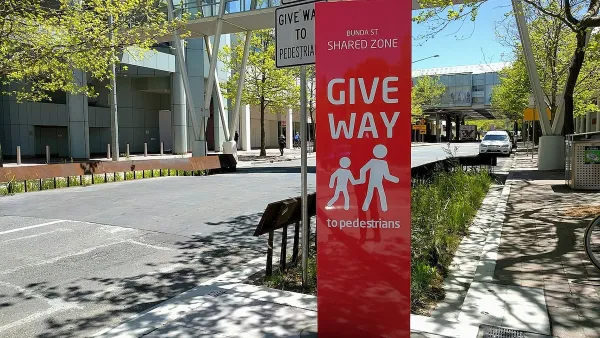Planetizen Managing Editor James Brasuell describes some of the recent changes to the Planetizen site.

As you might have noticed, we've redesigned Planetizen.
They say that websites are never finished—they're just abandoned. You can see that Planetizen is certainly neither.
The redesign is built on a few central concepts that respond to recent changes in how the Planetizen audience uses the site, as well some of the new and evolving expectations people have about how websites should look and feel.
Central Concept Number One
More users are arriving to Planetizen from other sites. It's not just one channel directing visitors to our site, but an evolving ecosystem of social media, search engines, and a growing roster of websites focusing on planning, cities, communities, and the natural environment. All of this traffic from external origins means a larger share of Planetizen visitors are arriving to the website at specific points of interest, rather than starting at the homepage and poking around for a while. In redesigning Planetizen, we attempted to make each of those arrival places more like a homepage—a place where exploration and discovery begins, rather than a place where the journey ends.
Central Concept Number Two
In deciding how best to provide a path for journey and discovery around the site, we needed to be more rigorous in organizing the many uses of the site. We identified four primary uses for the Planetizen's many resources, some of which overlap or supplement each other in varying degrees. Here are the four primary ways the Planetizen audience uses the site:
- Learning and research platform.
- Career and education development platform.
- Discussion and networking platform.
- Product and service marketplace.
We then decided where each of the many pages on the site fit into these purposes and organized new wireframes (the grid of the redesign, unadorned by design details or content) to minimize distractions while simultaneously inspiring more exploration. That might some like a contradiction of terms, but we endeavored to make the many pages on the site both focused and fruitful—which sounds like synchronicity to us. The organization of pages along these use patterns will also be apparent in the new menu, which is a good place to start in creating a mental map of the site and its resources.
Central Concept Number Three
Simplify. Simplifying is rarely simple. We were brutal in our assessment of the necessities for every page. The difference will be obvious on the homepage, which we trimmed a great deal, and throughout the site as well. We've also found opportunities to let visual components do the talking. Calculated at a ratio of one picture to every thousand words, images have been a key tool in removing some of the old clutter from the website.
Simplicity is also an important concept to improve the impact of the content we post on the site every day. Pages around the site appear more professional and clean, and a uniformity of style and design will provide a touchstone to the reader while they navigate between the diverse collection of voices, disciplines, and primary sources that populate our feed.
That's really most of it. Abhijeet Chavan, Cate Miller, Mindy Oliver, Lehel Matyus, Jill Lasak, Ki Kim, Maxwell Francisco, and I undertook the project of designing and developing the site.
We believe that the subject matter and resources provided on Planetizen offer chances for both self improvement and world improvement. We assume that Planetizen readers believe that their work, and their interest in their work, is of consequence to the future of the world, and we assume that the pursuit of new ideas and new skills is what brings people to Planetizen.
Please let us know if you have any comments or questions about the site, and bear with us as we track down and eliminate any bugs that might still be lurking around the site. Happy learning, job hunting, discussing, and everything else!

Planetizen Federal Action Tracker
A weekly monitor of how Trump’s orders and actions are impacting planners and planning in America.

Map: Where Senate Republicans Want to Sell Your Public Lands
For public land advocates, the Senate Republicans’ proposal to sell millions of acres of public land in the West is “the biggest fight of their careers.”

Restaurant Patios Were a Pandemic Win — Why Were They so Hard to Keep?
Social distancing requirements and changes in travel patterns prompted cities to pilot new uses for street and sidewalk space. Then it got complicated.

Platform Pilsner: Vancouver Transit Agency Releases... a Beer?
TransLink will receive a portion of every sale of the four-pack.

Toronto Weighs Cheaper Transit, Parking Hikes for Major Events
Special event rates would take effect during large festivals, sports games and concerts to ‘discourage driving, manage congestion and free up space for transit.”

Berlin to Consider Car-Free Zone Larger Than Manhattan
The area bound by the 22-mile Ringbahn would still allow 12 uses of a private automobile per year per person, and several other exemptions.
Urban Design for Planners 1: Software Tools
This six-course series explores essential urban design concepts using open source software and equips planners with the tools they need to participate fully in the urban design process.
Planning for Universal Design
Learn the tools for implementing Universal Design in planning regulations.
Heyer Gruel & Associates PA
JM Goldson LLC
Custer County Colorado
City of Camden Redevelopment Agency
City of Astoria
Transportation Research & Education Center (TREC) at Portland State University
Camden Redevelopment Agency
City of Claremont
Municipality of Princeton (NJ)






























